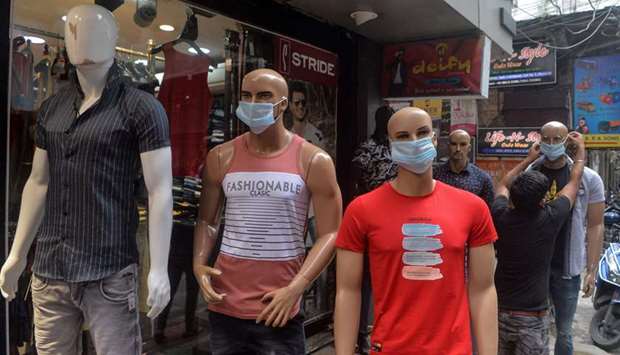India reported a record 9,887 new coronavirus cases in one day yesterday and overtook Italy as the world’s sixth-biggest outbreak, two days before the relaxing of a lockdown with the reopening of malls, restaurants and places of worship.
With its total number of cases rising to more than 236,000, India now has fewer infections than only the United States, Brazil, Russia, Britain and Spain.
Many new cases were reported from rural areas after hundreds of thousands of daily-wage migrant workers left cities and towns under lockdown to return to their villages, having found themselves without work during the pandemic.
Authorities began allowing their movement out of the cities in early May, leading to chaotic and crowded scenes at border checkpoints.
Almost half of the country’s known cases have been traced to the four huge, densely populated cities of Delhi, Chennai, Ahmedabad and Mumbai, where hospitals have already run out of beds and patients are kept on floors and share oxygen tanks.
However, India’s toll of deaths from Covid-19, the disease caused by the virus, is 6,642, small compared with those other countries.
Prime Minister Narendra Modi’s government, anxious to jump-start an economy crippled by the epidemic and put millions of people back to work, is easing its lockdown of the 1.3bn population imposed in March, which the government says helped avoid an exponential rise in cases.
Restrictions will be loosened from tomorrow but some experts are worried it is too soon.
Giridhar R Babu, epidemiologist at the Public Health Foundation of India, in particular questioned the re-opening of religious places.
“We can survive and sustain the gains without opening up religious places for sometime,” Babu said on Twitter.
Concerts, sporting events and political rallies are still banned.
The World Health Organisation (WHO) said late on Friday India’s lockdown had helped it dampen down transmission of the disease, but there was a risk the cases could rise again.
“As India and in other large countries open up and people begin to move there is always a risk of the disease bouncing back up,” Dr Mike Ryan, head of WHO’s emergencies programme, told a news conference in Geneva.
People visiting places of worship will be asked to wash their hands and feet, and there will be no distribution of food offerings, sprinkling of water or touching of statues and holy books.
lFor the second day in a row, the number of new Covid-19 cases crossed 100 in Kerala.
Yesterday also saw the death of 61-year-old former footballer Hamza Koya, who had arrived from Mumbai last month, raising the death toll to 15.
State Health Minister K K Shailaja said that of the new cases, 64 came from abroad, while 34 were from within the country. The remaining 10 are local patients.
“As on date 1,029 people are positive and are under treatment, while 762 have been cured. As many as 183,097 people are at present under observation in homes or corona care centres, including 1,615 in hospitals. With the addition of 10 more hotspot areas, the total number of hotspots in the state has risen to 138,” said Shailaja.
The Kerala government on Saturday came out with a fresh directive saying all those who come from abroad need to go for two-week home quarantine and only those who do not have proper facilities at home for quarantine can opt for institutional quarantine provided by the state government.
Earlier, the rule was all those coming from abroad should go for institutional quarantine for seven days.
l Since May 1, when the first train carrying migrant labourers left Kerala, 132 trains have carried 182,072 stranded workers to various states. On Friday, three more trains left Kerala with workers.
A Kerala labour official said some of those who returned had expressed their wish to come back.
“Calls have come from Bihar, Jharkhand and a few other states from migrant labourers who went back. They want to return as things have changed and work has begun in Kerala,” said the labour official.

Mannequins wearing face masks are installed outside a retail apparel store as a way to raise awareness regarding measures to take against the spread of the Covid-19 in Siliguri, West Bengal, yesterday.
